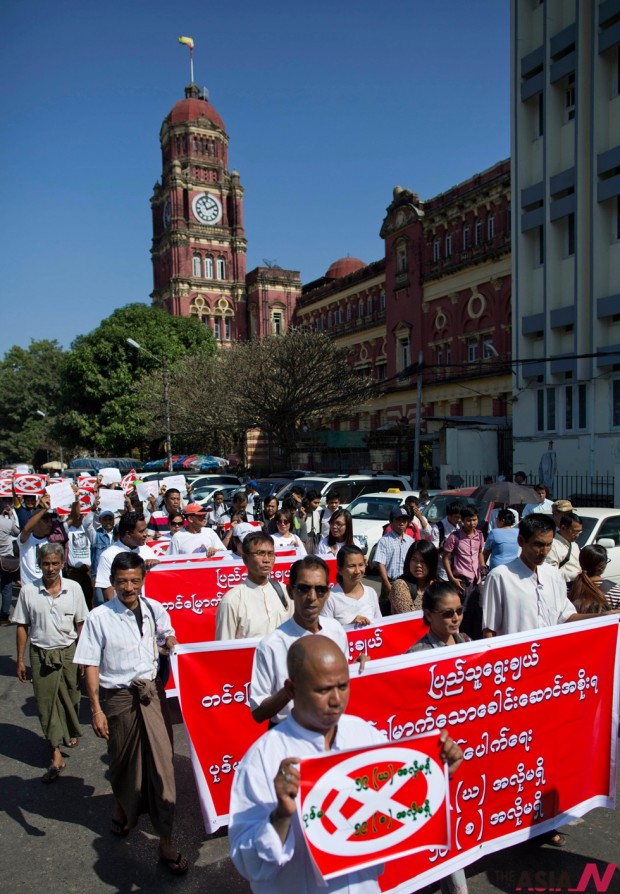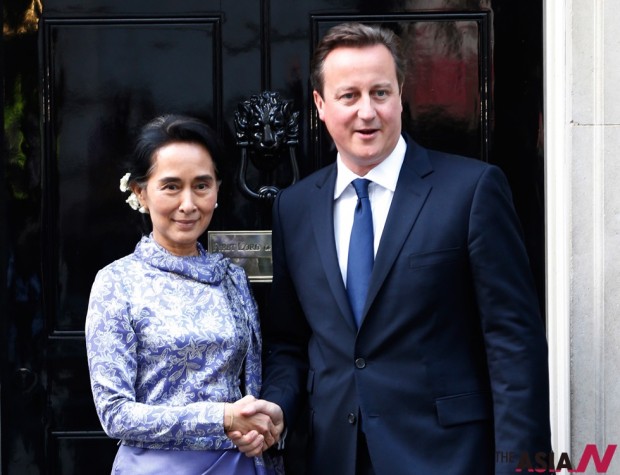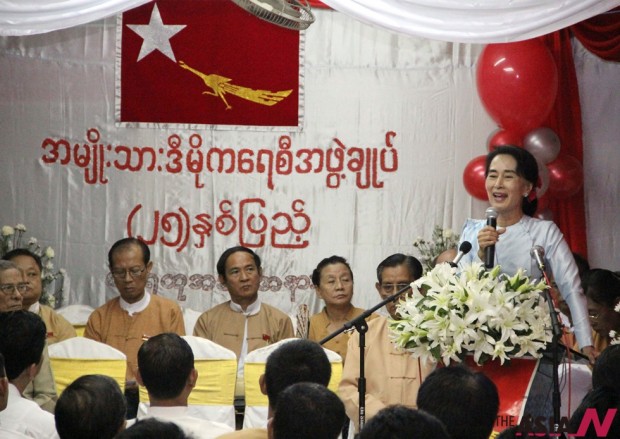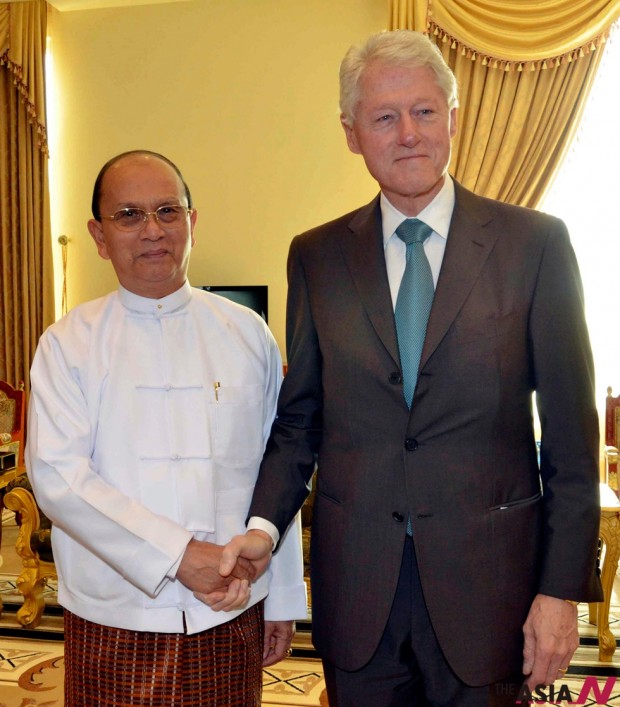Aung San Suu Kyi for President?

Supporters of Myanmar's opposition leader Aung San Suu Kyi display placards during a protest march supporting her to become Myanmar's president in Yangon, Myanmar, Jan. 3, 2014. (Photo: AP/NEWSis)
Recent signs point to Aung San Suu Kyi being able to vie for president in the 2015 elections.
First, the military-backed Union Solidarity and Development Party (USDP) has formally proposed amending a proviso in the constitution that bars her from being a candidate for the top leadership post. Clause 59(f) disqualifies citizens whose spouse or children are foreign citizens from being president. Aung
San Suu Kyi has two children who are British citizens and her late husband was also British.
The USDP move was followed up by President Thein Sein. “A healthy constitution must be amended from time to time to address the national, economic and social needs of our society. I would not want restrictions imposed on the right of any citizen to become the leader of the country,” he said in a clear hint of support for Daw Suu Kyi.
Daw Suu Kyi, who is keen to be president, had earlier raised the stakes by declaring her party would not find it meaningful to contest the elections under an undemocratic constitution.
However, any hint of a polls boycott was later dispelled by her National League of Democracy’s (NLD) declaration to take part in next year’s parliamentary polls with or without the constitutional amendment.
As the legislature elects the president, the NLD regards it as vital to contest and win the elections. The positive response to Daw Suu Kyi’s call for a level playing field from the USDP and President Thein Sein, reflected their reading of the popular sentiment and overwhelming support for the Nobel laureate to be Myanmar’s first civilian president.
At the same time, it appears to be a tilt to the Western powers that have been pushing the quasi-military government to speed up democratic reforms in keeping with inflow of aid and trade benefits.

Myanmar opposition leader Aung San Suu Kyi, left, shakes hands with British Prime Minister David Cameron, right, on the doorstep of his official residence at 10 Downing Street, Oct. 23, 2013. (Photo: AP/NEWSis)
British Prime Minister David Cameron had endorsed Daw Suu Kyi to bid for the presidency during her visit to Downing Street in October 2013 and pledged to lobby for the removal of the debarring clause in the military-crafted charter.
“We will do everything we can to build the international pressure to send the clearest possible message to the Burmese government that these changes must be made,” he told a press conference.
The European Union had weighed in when its foreign ministers at a meeting in December 2013 said the scrapping of the ‘presidency clause’ would show the world that Myanmar was committed to irreversible political reforms.
Notwithstanding proposals that would clear the way for Daw Suu Kyi to enter the presidential race, a close observer of the Myanmar political scene cautioned that changes would take time. For one, removing the debarring clause would have to work its way through parliament, where a quarter of the lawmakers are military appointees. Further, the proposed amendment must be approved by 75 per cent of the Members of Parliament in a national referendum.
Endorsed by Britain
For another, the military power brokers might be reluctant, as yet, to cede full authority to a civilian president like Daw Suu Kyi.
“They would want to protect their status and vested interests,” said the Myanmar political analyst. He pointed out that currently the military decides the defence budget and its personnel hold plum posts and major stakes in business ventures.
A more compelling reason that would make the generals and other officers resist giving up their dominance is the fear of retribution for the roles they played in brutally suppressing the pro-democracy movement. Daw Suu Kyi has good relations with the Tatmadaw and sees its future role as a professional defence force that stays out of politics.
Nevertheless, under a civilian government, pressure would quickly build up for a South African type of truth and a reconciliation commission to probe the killings and imprisonment of students, politicians, and monks by the military.
“The families of the victims would demand that the culprits be held accountable for their crimes,” said the veteran Myanmar analyst.
Faced with such an awful scenario, the army top brass could be expected to seek to keep its hold on power and postpone the day of reckoning for as long as possible. However, both domestic and international pressure might force the military to face up to the reality that it has to play by democratic rules or not at all.
Daw Suu Kyi has put it squarely to the military powers-that-be: “They need to have courage to deal with these challenges in order to have real national reconciliation. How can they improve the political situation if they keep pretending there is no problem?” she said.
Meanwhile, the NLD leader has seized another initiative by calling for a summit with President Thein Sein, House Speaker Shwe and Commander-in-Chief Senior General Min Aung Hlaing to push forward the charter discussions.

Myanmar Opposition Leader Aung San Suu Kyi, right, smiles as she delivers a speech during a ceremony at her party headquarters in Yangon, Myanmar, Sept. 27, 2013. Suu Kyi attended the ceremony to mark the 25th anniversary of the founding of her party, National League for Democracy (NLD). (Photo: AP/NEWSis)
A parliamentary panel is studying wide-ranging proposals for changes to the 2008 constitution submitted by various parties. Daw Suu Kyi and her party are pressing for the scrapping of unfair clauses in the junta-crafted charter. One is clause 59(f), which is targeted at her.
Another is the 25 per cent reserved seats for military appointees in the 440-member legislature. The military might have conceded on the presidency clause, but has given no hint on dropping those enshrining its dominance. Indeed, it could even devise new proposals to counter Daw Suu Kyi’s chances or curb her powers as president in 2015.
One possibility is for the powers behind the scenes to encourage President Thein Sein to run against Daw Suu Kyi. The former general has earned kudos at home and abroad for his economic and political reforms. He has not declared his intention to seek a second term. If he does and campaigns on his track record, the 68-year-old leader would be a formidable foe to beat.
Union Speaker of Parliament Shwe Mann has also declared he would vie for the post of president. The entry of the chairman of the army-backed Union Solidarity & Development Party, who ranked No. 3 in the former military junta, would make it a three-corner presidential contest.
Former general Shwe Mann is touted as the army’s choice as successor to President Thein Sein. However, the military is not ruling out having to deal with Daw Suu Kyi as the next president.
“There is nothing to prevent the generals from tweaking the constitution to dilute the powers of the president vis-a-vis the other office-holders,” said the Myanmar analyst.

Myanmar President Thein Sein, left, shakes hands with former U.S. President Bill Clinton, after their meeting to discuss challenges facing the emerging democracy following a half-century of military rule at Presidential Palace, Nov. 14, 2013, in Naypyitaw, Myanmar. (Photo: AP/NEWSis)
Military reluctant to face accountability
In any event, the military would willy-nilly need to seek an accommodation with Nobel Peace Prize winner Daw Suu Kyi as a prospective head of state.
The Western powers are keeping close tabs on Myanmar’s constitutional changes in the run-up to the 2015 general elections as an acid test of its democratic progress. These liberal democracies have led it be known that they expect Yangon authorities to amend the charter and let Daw Suu Kyi contest for presidency.
Are the Western nations too optimistic or even realistic in expecting Myanmar to adopt or closely follow the liberal democracy model?
Myanmar has had its honeymoon with parliamentary democracy and federalism after gaining independence in 1948. But the experiment with Western parliamentary systems was doomed by political infighting and ethnic wars of secession. The ensuring chaos and instability led the military under General Ne Win to seize power in a coup in 1962. He was to perpetuate dictatorship till fresh elections in 1990 and in 2010 put Myanmar on the democracy road again.
“(Now) everybody is buying into liberal democracy,” said the analyst. “Except elements of the military. They say, ‘why should we give up what we have paid for in blood?”
Ironically, the same cry could be made by civilian activists who shed blood in fighting for freedom and human rights. They are continuing to demonstrate in Yangon, this time to ensure their champion of democracy gets a good and deserving shot at the presidency.























































